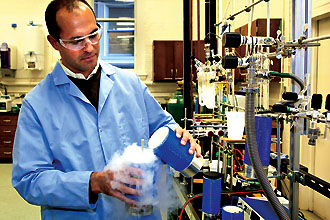Oil Spill Research Hits Tulane Labs
Tulane University scientists are among more than 150 recipients of National Science Foundation Rapid Response Research grants to study the impact of oil that spewed from the Macondo oil field into the Gulf of Mexico after the explosion of the Deepwater Horizon drilling rig.

Brad Rosenheim, assistant professor of earth and environmental sciences, has a National Science Foundation grant to adapt an instrument that will trace oil in the environment. (Photo by George Long)
Brad Rosenheim and Vijay John from the School of Science and Engineering are among several Tulane researchers involved in the projects. Rosenheim is working on a way to trace oil in the environment, and John is studying the characteristics of dispersants.
Rosenheim, an assistant professor of earth and environmental sciences, received a RAPID-MRI grant to adapt an instrument to fingerprint the oil and its weathered components at the isotope level in marsh and beach sediments. Rosenheim said this procedure will allow researchers to trace the oil as it is incorporated into the environment.
"In years to come, when we see marshes that are dying and we can't see the cause, we will want to know if oil is the underlying cause or if natural processes are prevailing," says Rosenheim. "This technique will be able to detect the presence of oil and products of its breakdown, when it cannot be seen in the environment."
John, a chemical and biomolecular engineering professor, will study the characteristics of the tiny droplets that form when dispersants are used to break up oil under the high pressures and low temperatures in the deep water at the well head.
"The uniqueness of this project," says Johnâ "is that this is the first time dispersants have been used at these depths, and no one knows how and why they work."
John also will test biodegradable surfactants and novel particles for possible use as dispersants and the implementation of emulsions that would deposit the oil as sediment to the ocean floor where it could be biodegraded.
The National Science Foundation offers Rapid Response Research grants in incidences of disasters and other unanticipated events where a timely response is fundamental in achieving research results.
Belinda Lacoste is a student studying journalism in the School of Continuing Studies and a staff member who writes for the School of Science and Engineering.
